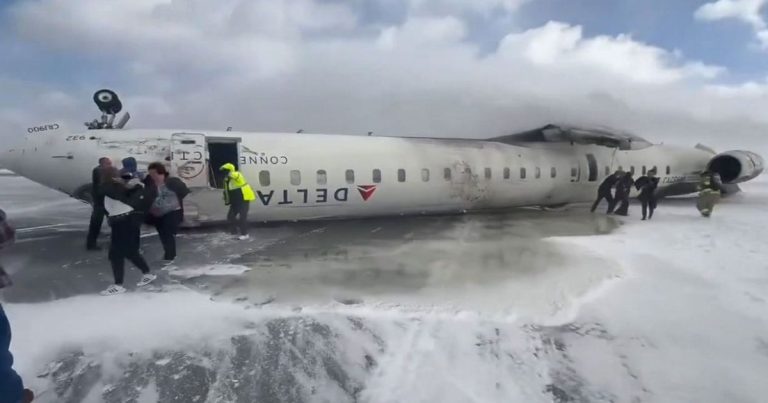
Remember when American skies were the safest in the world? That reputation is rapidly changing. In a disturbing trend that should concern every American traveler, aviation disasters have claimed over 250 lives in just the past two months, marking one of the deadliest periods in recent aviation history.
From Washington, D.C., to Alaska, we’re witnessing a troubling pattern of aviation incidents that demand serious answers. And let’s be clear – these aren’t just statistics. These are American lives at stake.
The latest incident unfolded at Toronto’s Pearson International Airport, where a routine landing turned into a horrifying ordeal for 80 passengers and crew members. The Delta Connection flight from Minneapolis ended with a CRJ-900 jet flipped upside down on the tarmac, leaving 21 people injured – three critically.
Delta Takes Swift Action
In a move that speaks volumes about private sector leadership, Delta Air Lines announced Wednesday that it would provide $30,000 to each passenger and crew member aboard the Toronto flight. This represents a total commitment of approximately $2.4 million.
Unlike typical government responses that get tied up in red tape, this private sector solution came swiftly and decisively.
From Fox Business:
“Delta Air Lines confirmed the plans to provide $30,000 to each victim — 76 passengers and four crew members — to FOX Business on Wednesday. A spokesperson noted that the gesture ‘has no strings attached and does not affect rights.'”
Social media critics were quick to snipe at the compensation amount. One X user sarcastically commented that Delta was offering “a $30 gift card and an extra bag of pretzels” to passengers who survived their plane flipping over.
Let’s be honest – while the mainstream media obsesses over compensation amounts, they’re missing the bigger picture about aviation safety leadership. This isn’t just about money – it’s about accountability and swift action.
The numbers tell a sobering story. January of 2025 saw 67 Americans perish near Washington, D.C., when a military helicopter collided with a commercial flight. February brought another tragedy, with 10 lives lost in an Alaska commuter plane crash. Meanwhile, international incidents in South Korea and Azerbaijan have claimed hundreds more victims.
The timing of these incidents raises serious questions about current aviation oversight that nobody in Washington seems eager to address.
Leadership and Safety Standards
Finally, someone’s willing to speak truth about the effectiveness of Trump-era aviation policies. Delta CEO Ed Bastian offered a strong defense of previous administration’s approach to FAA management, cutting through the political noise with clear facts.
“The Trump administration has committed to investing deeply in terms of improving the overall technologies that are used in the air traffic control systems and modernizing the skies,” Bastian explained. “They’ve committed to hiring additional controllers and investigators, and safety investigators.”
This statement comes at a crucial moment when Americans are demanding answers about aviation safety. While government bureaucrats shuffle papers, private industry leaders are taking action.
The contrast couldn’t be clearer: While government agencies debate and delay, private sector solutions are already taking flight. Delta’s rapid response demonstrates exactly why American business leadership, not government overreach, has historically made our aviation industry the global standard.
The real question isn’t about compensation amounts – it’s about whether we’ll allow bureaucratic micromanagement to replace the proven effectiveness of market-driven solutions. History shows us which path leads to safer skies.
Key Takeaways:
- Delta’s swift $30,000 compensation offer demonstrates private sector efficiency while government bureaucracy struggles with aviation safety.
- Recent aviation disasters under current leadership raise serious questions about regulatory effectiveness.
- Trump-era aviation policies focused on modernization and technology investment continue to receive industry support.
- Market-driven solutions prove more responsive than government intervention in addressing passenger safety concerns.
Sources: Fox Business
